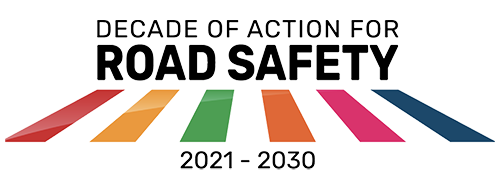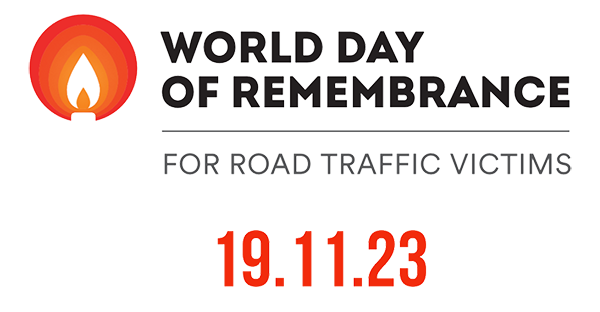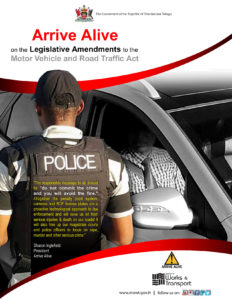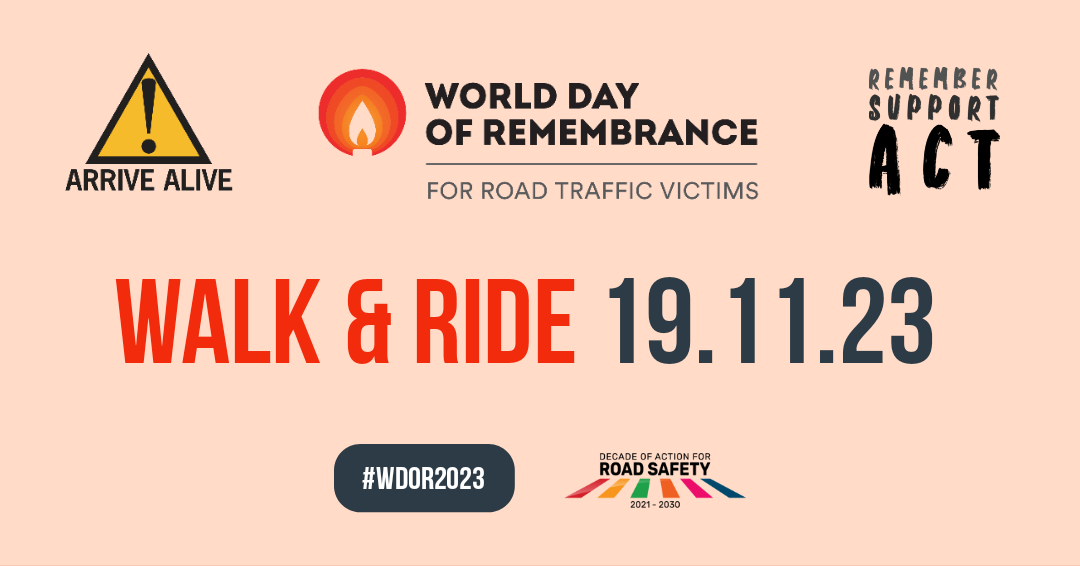Motor Vehicles and Road Traffic Act

You can download and view the Motor Vehicles and Road Traffic Act HERE, but they are rather difficult to follow, so we’ve simplified some of the most serious offences for you. Please remember that these are not official legal documents.
Here is Chapter 48:50 of the Laws of Trinidad & Tobago from the Highway Patrol Booklet detailing fines for traffic offences.
DRIVING UNDER THE INFLUENCE
You should not drive a vehicle if you are under the influence of alcohol to the extent that you do not have proper control of the vehicle. In such a circumstance, the penalties are:
- 1st offence – TT$12,000 or 3 years imprisonment
- 2nd offence – TT$22,500 or 5 years imprisonment and driving suspension for 3 years
- 3rd offence – permanent loss of licence
The legal limit is 35 micrograms of alcohol per 100 millimetres of breath. It’s important to note that in other jurisdictions this limit is even lower due to the number of serious injuries and fatalities caused by driving under the influence or driving impaired.
If you are over the limit, the officer will take another breath sample from an evidential unit that prints out your name, time, date, alcohol level, the officer’s name and badge number, and the officer has the right to arrest you immediately after this—they do not need a warrant.
There are 5 breathalyser DUI offences:
- Driving a vehicle under the influence
- Attempting to drive, i.e. keys in your hand walking towards the vehicle
- Being in charge of the vehicle, e.g. in the back seat with keys in hand
- Failure or refusal to provide a breath sample
- Altering or tampering with the concentration of alcohol in your breath
DANGEROUS DRIVING
The word ‘dangerous’ refers to danger of either injury to any person or of serious damage to property.
Dangerous driving is driving in a way that a competent and careful driver WOULDN’T. This includes speeding.
Driving dangerously can include the vehicle itself and anything carried by the vehicle or attached to it.
Circumstances also come into play: if a careful and competent driver would realise that the situation requires more careful driving and you don’t adjust your driving to suit, then you might be driving dangerously.
If you drive dangerously on the road, the penalty is a fine of TT$10,000, 5 years imprisonment and loss of your licence for at least a year. If you are a repeat offender, you could lose your licence permanently.
If you kill someone on the road by driving dangerously, the penalty is 15 years imprisonment.
Any police officer can arrest you without a warrant for dangerous driving if:
- You refuse to give your name and address.
- The officer has reason to believe that the name or address so given is false.
- The motor vehicle does not bear an identification plate.
You can also be arrested and convicted for not driving with due care and attention, or without reasonable consideration for other persons using the road.
The penalties here are a fine of TT$1,000 and your licence can be suspended at the discretion of the judge.
DRIVING WITHOUT INSURANCE
You cannot drive or allow someone else to drive a vehicle or licensed trailer on a public road unless there is insurance with respect to third party risk, i.e. third party insurance that will cover damages to someone else or someone else’s property.
The penalty is a fine of TT$5,000, imprisonment for 2 years and loss of your licence for at least 3 years.
DRIVING WITHOUT A VALID LICENCE OR PERMIT
You can’t drive a motor vehicle on a road unless you have a valid driving permit for a motor vehicle of that class (private, hire, heavy T, etc.).
The penalty is a fine of TT$500 or 6 months imprisonment.
If you have never applied for a permit, applied and were turned down, or if your licence has been revoked for any reason and you are found driving, the penalty is a fine of TT$1,000 or 1 year in prison. You can be arrested immediately without a warrant.
DRIVING WITHOUT A SEAT BELT
Every vehicle under a TARE weight of 3,000 kg has to have front seat belts fitted (for the driver and front seat passenger/s) as an integral (not optional) part of the vehicle, before it can be licensed. That includes private cars, T-registered vehicles and vehicles used to transport the public (taxis). These belts need to be able to restrain both the upper and lower body (shoulder and lap belts), except if there are three seats in the front (bench seats). In this case, the middle seat can have just a lap belt.
The registered owner is the one at fault if this is contravened, and the penalties are:
- 1st offence – a fine of TT$1,000
- Any subsequent conviction – a fine of TT$2,000
Any person occupying a front seat in any motor vehicle subject to the seatbelt regulation shall wear a seat belt while the motor vehicle is in motion. If, however, you can prove at the material time that you hold a valid certificate signed by a legally qualified medical practitioner to the effect that it is inadvisable on medical grounds for you to wear a seat belt, you will not be charged.
A fine of TT$1,000 is the penalty for breaking this law. If the guilty person is 16 years of age or more, they must pay the fine. If the person is more than 2 years of age and less than 16, the driver is responsible.
Children under the age of 5 should be in a child seat or a booster seat, buckled up in the back seat of the vehicle. The appropriate seat depends on the height and weight of the child and it is important to note that child seats, just like tyres, have expiry dates. To protect your child, ensure that you purchase an appropriate seat and read the instructions carefully. Children are best protected in the rear of a vehicle, even over 5 years of age, since the impact (including that from airbags) could cause serious damage to a small frame.
These are just a few of the ticketable offences. You can view the Motor Vehicles and Road Traffic Bill 2014 currently under debate in Parliament HERE and the Motor Vehicles and Road Traffic Act HERE.
Disclaimer
The materials available at this website are for informational purposes only and not for the purpose of providing legal advice. You should contact your attorney to obtain advice with respect to any particular issue or problem.








